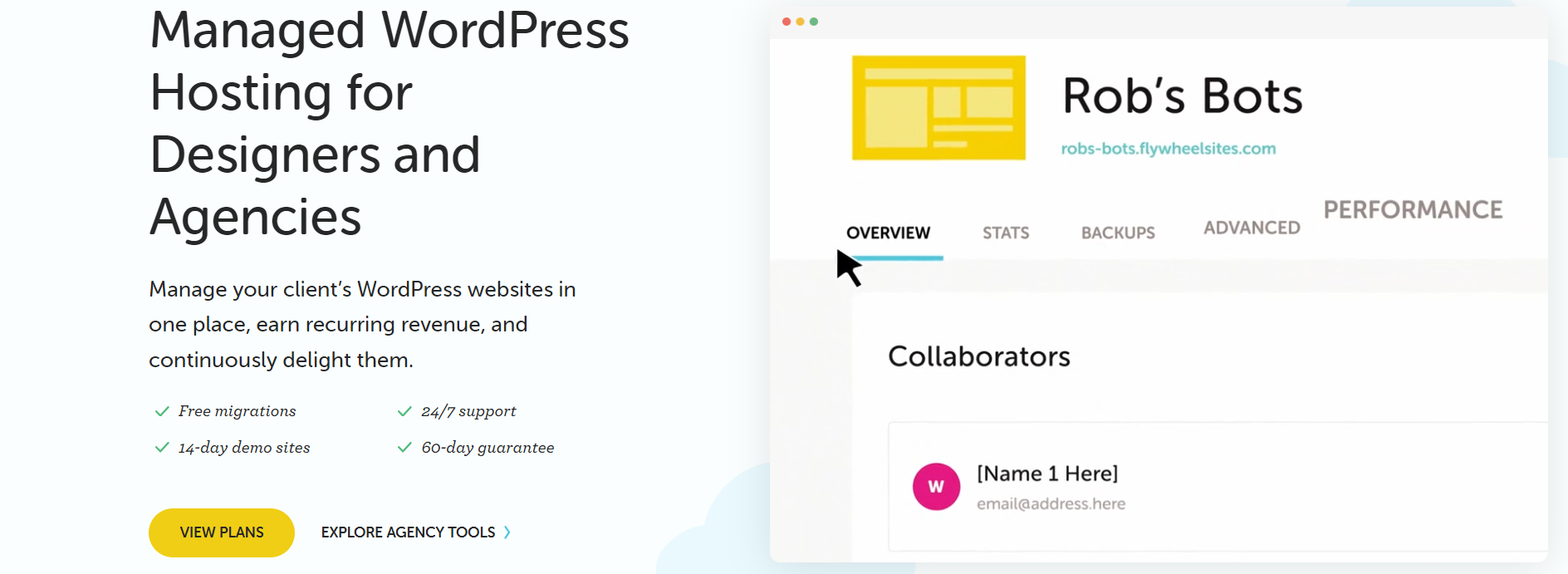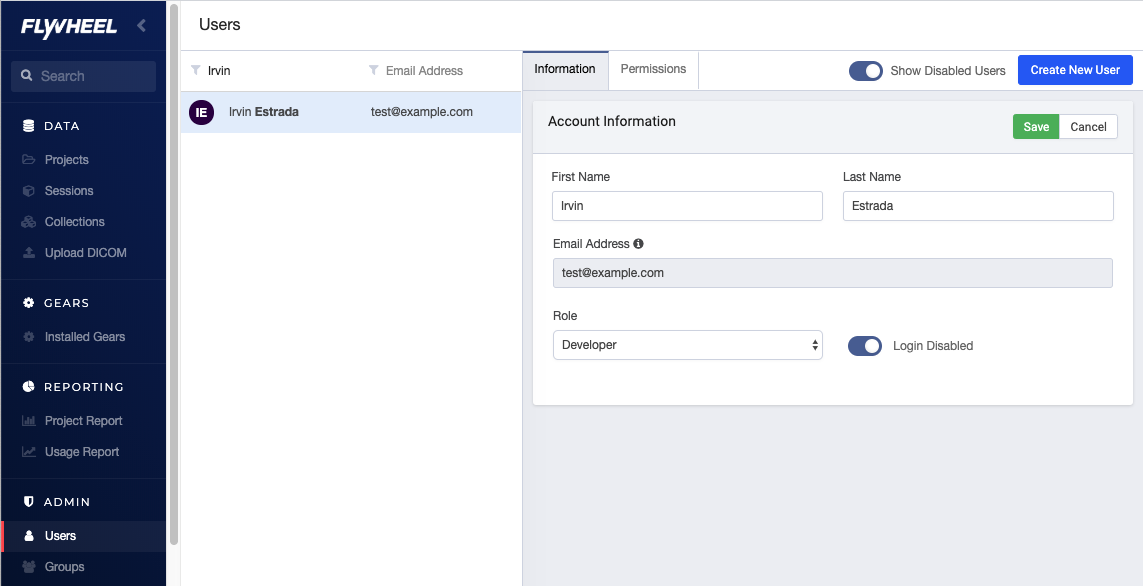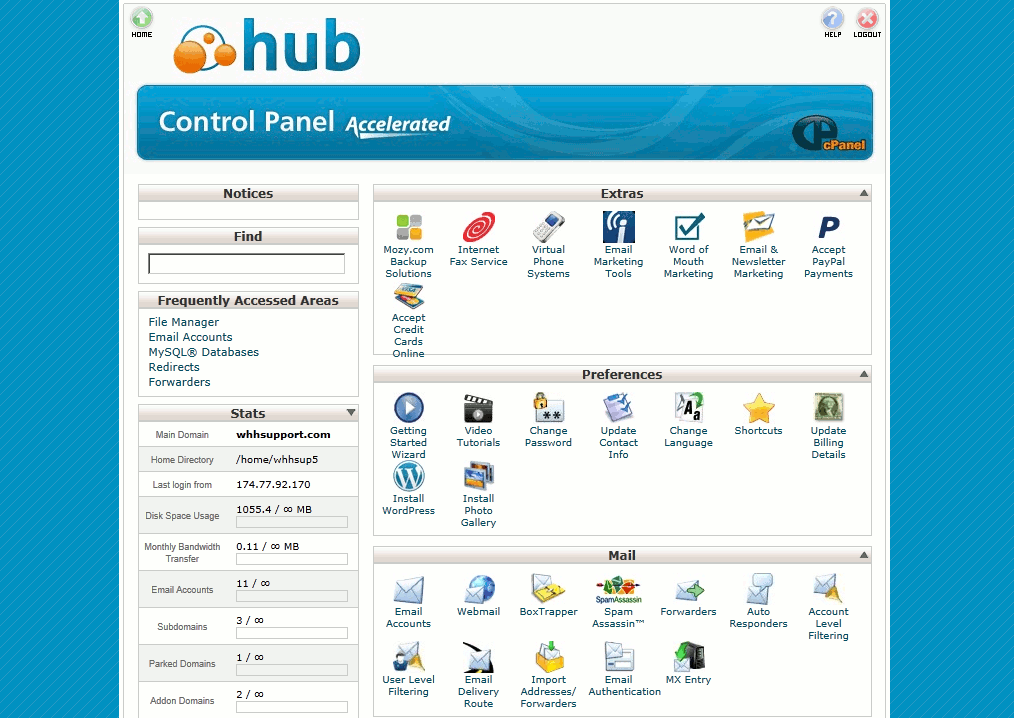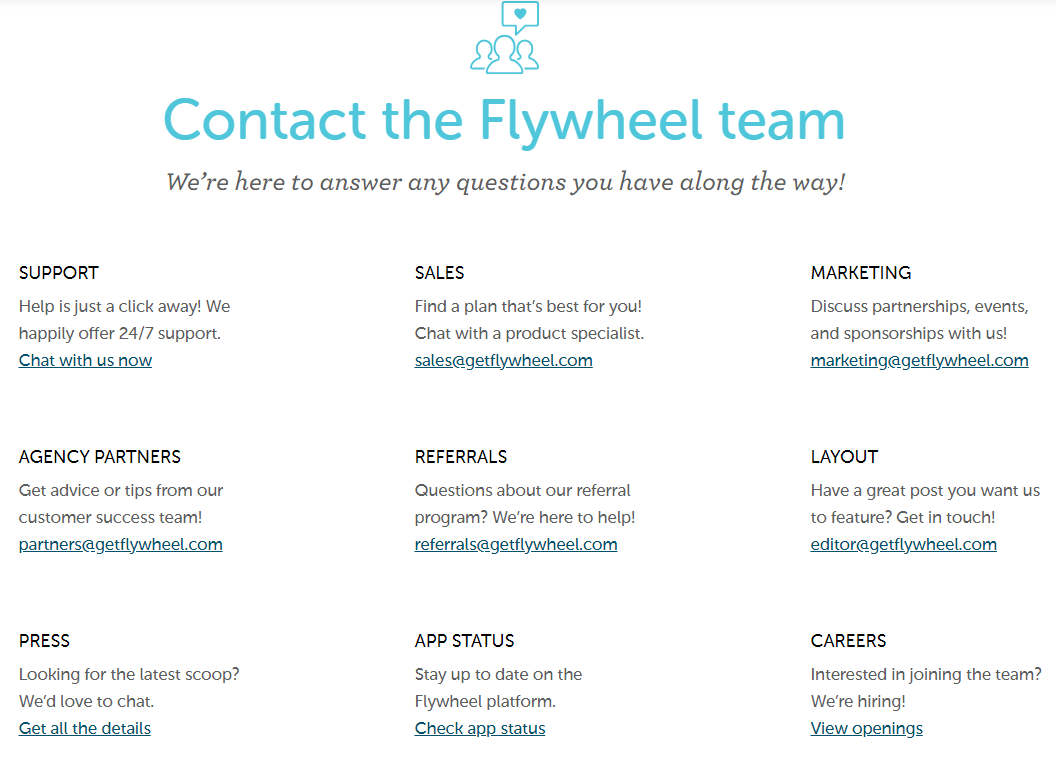Flywheel vs Web Hosting Hub: Final verdict
Flywheel (Overall grade: 8.4)
is particularly strong for managed WordPress hosting. It provides specialized features such as FlyCache, Blueprint, and a staging environment, making it ideal for WordPress users and agencies managing multiple sites. Flywheel excels in performance with a 100% uptime record in tests, fast response times, and advanced security measures like auto-healing technology and plugin security alerts. However, Flywheel does not offer email hosting and might incur additional costs for traffic overages. The platform is also highly user-friendly, with a custom dashboard and an efficient user management system with detailed roles for team collaboration.
Web Hosting Hub (Overall grade: 7.5)
is a versatile hosting provider well-suited for a wide range of users, thanks to its competitive pricing, unlimited resources on higher-tier plans, and user-friendly website builder, BoldGrid. It supports unlimited websites and databases and includes a free domain and email hosting. While it offers significant first-time discounts and a longer 90-day money-back guarantee, its performance and features are tiered, which might limit high-demand users. Although it uses the standard cPanel interface that is familiar and comprehensive, it doesn’t match the WordPress-specific optimizations or high-security standards provided by Flywheel. Despite these limitations, Web Hosting Hub’s extensive feature set and solid customer support make it a reliable choice for general hosting needs.
 Overall grade:8.4 |
 Overall grade:7.5 |
|
|---|---|---|
| Uptime and Availability | 9.7 | 9.2 |
| Hosting Performance | 8.2 | 5.0 |
| Hosting Security | 9.4 | 8.0 |
| Price | 8.1 | 7.6 |
| Hosting Features | 6.8 | 6.9 |
| Ease Of Setup | 8.9 | 8.8 |
| User Management | 7.8 | 7.1 |
| Customer Support | 8.5 | 7.8 |
| User feedback | 4.4/5 | 4.5/5 |
Hosting types offered
Both platforms provide a variety of hosting types, each designed to meet the different needs of users.
 |
 |
|
|---|---|---|
| Shared hosting | ||
| Cloud hosting | ||
| WordPress hosting | ||
| Ecommerce hosting | ||
| VPS hosting | ||
| Dedicated hosting |
Although both offer a variety of hosting plans tailored to different needs, in certain cases, one platform may prove to be more suitable.
Detailed comparison
Uptime and availability
Evaluates the average uptime statistics, uptime guarantee and overall availability of the hosting
provider
Score Components:
- Uptime percentage (30%): evaluates the uptime statistics in given period of time
- Uptime guarantee (20%): Assesses if the platform offers an uptime guarantee and
whether the actual uptime matches the promised guarantee. - General performance (25%): Evaluates how fast is the average response time and overall
it’s stability. - Responsiveness (10%): Adaptability to different devices and screen sizes.
- Availability (25%): Reflects the total downtime and number of outages.
 9.7
9.7
 9.2
9.2
🏆 Winner Flywheel: Delivers top-tier uptime and remarkable performance.

Flywheel excels with its higher than standard 99.9% uptime, achieving an impressive 100% in tests. Leveraging Google Cloud servers, Flywheel ensures fast response times, averaging 371ms. Additionally, their 24/7/365 support and a 60-day money-back guarantee provide a reliable and customer-friendly experience.

Meanwhile, Web Hosting Hub offers competitive pricing and solid speed enhancements thanks to free SSD and unlimited bandwidth. Their performance tiers, including the Spark, Nitro, and Dynamo plans, cater to various needs and budgets. With a 90-day money-back guarantee, users can explore their hosting solutions risk-free.
Which one has better hosting performance?
Score Components:
- Hosting speed (30%): This includes SSD quality, Load times, PageSpeed score ranges,
additional information on website speed, built-in plugins for performance enhancement, available caching
methods, and CPU/RAM options - CDN (20%): Considers whether CDN is available or not, whether it’s free or paid, and
the quality of the CDN service - Available data centers (30%): Evaluates the number of data centers and their locations
globally. - Scalibility (20%): Looks at whether elastic scaling is available, the process required
to scale (manual upgrade vs. automatic scaling), the presence of dedicated servers, and the costs
associated with scaling.
 8.2
8.2
 5.0
5.0
🏆 Winner
Flywheel: Speedy and optimized managed WordPress hosting.
Flywheel and Web Hosting Hub offer different levels of performance suited for various needs. Flywheel stands out with its exclusive Flywheel Cloud Platform designed for optimal WordPress performance. It provides managed caching and performance insights, ensuring high-speed performance without the need for plugins. Flywheel also features a CDN powered by Fastly and dedicated resources for each site, contributing to its top-tier performance. On the other hand, Web Hosting Hub offers three levels of plans (Spark, Nitro, Dynamo), with Dynamo providing the highest resources and speed enhancements. While both include SSD storage for faster load times, Flywheel goes a step further with advanced technologies like auto-healing and compute-optimized dedicated servers for WooCommerce sites. Web Hosting Hub provides standard performance enhancements through its plans but lacks the specialized WordPress optimizations that Flywheel offers.
Website Speed
Flywheel offers superior website speed, leveraging its managed caching, CDN integration, and dedicated resources. By handling caching at the server level and collaborating directly with customers, it achieves exceptional load times. Flywheel’s auto-healing technology and compute-optimized dedicated servers ensure consistently high performance, making it a reliable choice for high-traffic sites. Web Hosting Hub, on the other hand, provides different levels of memory and processing power across its plans, with Dynamo delivering up to 4X speed. While it offers unlimited SSD storage and data bandwidth, it doesn’t match Flywheel’s specialized WordPress performance enhancements.
Scalability
Flywheel allows for easy scalability with custom-built plans for specific requirements or higher traffic needs. Upgrading is straightforward, and its dedicated resources mean that performance isn’t impacted by other users. While Flywheel’s overage charges are clear at $1 per 1,000 extra monthly visitors and $1 per GB of extra storage, the exact cost of scaling depends on individual requirements. Web Hosting Hub also supports scalability but typically requires plan upgrades to accommodate increased resource needs. Flywheel’s dedicated server options for WooCommerce sites add another layer of performance and scaling capability that Web Hosting Hub doesn’t offer.
Which one has better security features?
and regulatory requirements
Score Components:
- Technical security measures (40%): This includes encryption, firewalls, DDoS
protection, secure configurations, server monitoring, access control and availability of security addons
(e.g Sitelock security). - Operational security measures (30%): Encompasses data privacy, backups and data
redundancy. - Compliance and certifications (20%): Adherence to legal and regulatory requirements
(e.g., GDPR, HIPAA) and possession of certifications (e.g., ISO 27001, SOC 2). - Business and reliability (10%): Factors in the provider’s reputation, uptime
guarantees, and customer support.
 9.4
9.4
 8.0
8.0
🏆 Winner Flywheel: Flywheel is a standout choice with its advanced security features and comprehensive compliance measures.
Both Flywheel and Web Hosting Hub, have notable differences in their approaches to technical and operational security, as well as in their compliance with regulations.
Technical security measures:
Flywheel excels in technical security with PHP 8.1 support, whereas Web Hosting Hub offers PHP 7, which, while secure, is not the latest version. Both providers offer free SSL certificates and support third-party SSLs, ensuring secure connections for all hosted sites. Flywheel goes further by providing Fastly WAF and Intelligent IP Blocking to protect against various threats. Web Hosting Hub counters with advanced policy firewall protection and suPHP encryption. Notably, Flywheel provides auto-healing technology, a significant advantage over Web Hosting Hub’s standard security suite. Both hosts offer nightly backups, but Flywheel extends them for 30 days at no additional cost, unlike Web Hosting Hub.
Operational security measures:
Flywheel offers features like nightly backups, plugin security alerts, free malware removal, and a role-based permission model. Web Hosting Hub includes automatic backups, password-protected directories, IP blocking, hotlink protection, and SSH access. Flywheel’s federated identity service simplifies authentication, which Web Hosting Hub does not offer. Both providers promise 24/7/365 support, although Flywheel specifies dedicated WordPress experts, whereas Web Hosting Hub provides U.S.-based support via live chat and phone. Additionally, Flywheel’s free site migrations offer a more streamlined experience for users.
Compliance and certifications:
Flywheel stands out with a robust compliance portfolio, including HIPAA, GDPR, 21 CFR Part 11, GCP, and SOC 2 audit certification. It offers advanced de-identification tools and validated clinical trial data management. In comparison, Web Hosting Hub does not specify compliance with these standards but emphasizes data security and privacy.
 |
 |
|
|---|---|---|
SSL Certificate |
Free and third-party |
Free and third-party |
Additional Security Features |
Fastly WAF, Intelligent IP Blocking, Plugin Security Alerts, Free Malware Removal, Auto-Healing |
Advanced Policy Firewall, suPHP, Hotlink Protection, Password-Protected Directories, IP Blocking, GnuPG, Custom Error Pages, Server Side Includes, Custom Cron Jobs, SSH Access |
PHP Versions |
PHP 8.1 |
PHP 7 |
GDPR Compliance |
Yes |
Not specified |
HIPAA Compliance |
Yes |
Not specified |
PCI Compliance |
Not specified |
Not specified |
Hosting features
Score Components:
- Domains (20%): Assesses the availability of a free domain, domain purchase options, and
pricing - Email (15%): Considers if the provider offers full email hosting, or is reselling
third-party service, and if the email is only transactional or not - Website builder (15%): Checks if website builder is available, and it’s user
friendliness and overall the level of customization allowed. - Staging environment (20%): Determines if a staging environment is available, allowing
for testing changes before going live. - FTP & SFTP accounts (10%): Evaluates if and how easily users can access FTP and
SFTP accounts - Git and SSH access (20%): Assess whether Git is integrated into the hosting service and
if SSH access is provided
 6.8
6.8
 6.9
6.9
🏆 Winner Web Hosting Hub: Reliable hosting with a wide range of features, making it a robust choice for various hosting needs.
Flywheel and Web Hosting Hub both offer excellent hosting services, but they cater to different needs. Flywheel specializes in managed WordPress hosting with many features specifically designed for WordPress users. It provides a local development environment, staging sites, and unique tools like FlyCache and Blueprint. Flywheel’s platform also highlights security with managed updates and plugin security alerts, making it an excellent choice for users who need a secure, performance-optimized WordPress hosting solution. Flywheel’s unique selling points include 10 StudioPress Themes, the Genesis Framework, and a 60-day money-back guarantee, though they lack email hosting and may incur additional costs for overages.
Web Hosting Hub, featuring a standard web hosting model, provides broader base hosting, including unlimited websites and databases in higher plans, a free domain, and unlimited email accounts. Their plans also offer SSD storage, making them substantially quicker than traditional HDD-based systems. A notable advantage with Web Hosting Hub is their inclusion of a free website builder, BoldGrid, which is user-friendly and comes with drag-and-drop functionality. They also offer significant first-time discounts and a straightforward 90-day money-back guarantee. However, Web Hosting Hub’s performance features vary by plan and are capped under different performance tiers, potentially limiting high-demand users.
 |
 |
|
|---|---|---|
Free domain |
No |
Yes |
Free SSL |
Yes |
Yes |
Email hosting |
No |
Yes |
Website builder |
No |
Yes |
Staging environment |
Yes |
No |
FTP & SFTP accounts |
Yes |
Yes |
Git and SSH access |
Yes |
Yes |
Free backup |
Yes |
Yes (for $1/month) |
Money-back guarantee |
Yes, 60 days |
Yes, 90 days |
a location.
As a result in rare cases the features mentioned here can differ from the ones you see on their websites.
Both providers support a range of users from beginners to experts with user-friendly website builders and WordPress staging areas. However, in terms of developer tools, both Flywheel and Web Hosting Hub offer robust options including SSH access, support for multiple programming languages, and Git for version control, thus appealing to developers looking for advanced capabilities.
Email services:
Flywheel does not provide email hosting services and recommends external providers like Google Apps, making it less ideal for users who need integrated email services. Conversely, Web Hosting Hub offers unlimited email accounts with features such as secure POP3/IMAP, email forwarding, and spam protection. This makes Web Hosting Hub a more comprehensive choice for users needing robust email hosting alongside their website hosting.
Price
Score Components:
- Plan value (40%): What each pricing tier offers.
- Transparency and clarity (30%): Clearness of pricing structures.
- Flexibility of plans (20%): Range of options to suit different budgets.
- Hidden costs (10%): Additional expenses not included in the plan.
 8.1
8.1
 7.6
7.6
🏆 Winner Flywheel:Exceptional features with varied pricing plans to suit different needs.
Evaluating the pricing of plans among various hosting providers can be complex due to their differing pricing and renewal strategies. Additionally, certain plans require annual commitments, which adds to the difficulty of making comparisons. The prices listed are based on monthly commitments; plans requiring annual commitments are indicated. Additionally, although some providers offer identical plans for WordPress and shared hosting, we have created separate tables for each to enhance clarity.
Flywheel offers a variety of plans focused on WordPress hosting ranging from $13/month for the Tiny Plan to $242/month for the Agency Plan. Web Hosting Hub, on the other hand, provides competitively priced shared hosting plans like the Spark Plan at $11.99/month. Flywheel stands out for its specialized features like managed plugin updates and performance insights at additional costs. Web Hosting Hub emphasizes unlimited resources and added bonuses like free advertising credits across its plans.
 |
 |
|---|---|
|
Tiny Plan$13/month
1 site, 5GB storage, 20GB bandwidth, 5,000 visits, 24/7 chat support, SSL, Genesis Framework, nightly backups, site cloning, Google Analytics add-on Value for price:8.0
|
Spark Plan$11.99/month
2 websites, SSD storage, unlimited bandwidth, standard performance, unlimited email accounts, free domain, SSL, free website transfer, auto-installed WordPress, $150 advertising credits Value for price:7.5
|
|
Starter Plan$25/month
1 site, 10GB storage, 50GB bandwidth, 25,000 visits, 24/7 chat support, SSL, Genesis Framework, nightly backups, site cloning, Google Analytics add-on Value for price:8.3
|
N/A |
|
Freelance Plan$96/month
Up to 10 sites, 20GB storage, 200GB bandwidth, 100,000 visits, 24/7 chat support, SSL, Genesis Framework, nightly backups, site cloning, Google Analytics add-on Value for price:8.5
|
N/A |
|
Agency Plan$242/month
Up to 30 sites, 50GB storage, 500GB bandwidth, 400,000 visits, 24/7 chat support, SSL, Genesis Framework, nightly backups, site cloning, Google Analytics add-on Value for price:8.7
|
N/A |
|
Custom PlanCustom pricing
30+ sites, custom storage, custom bandwidth, millions+ visits, 24/7 chat support, SSL, Genesis Framework, nightly backups, site cloning, Google Analytics add-on Value for price:8.9
|
N/A |
 |
 |
|---|---|
| N/A |
Spark Plan$11.99/month
2 websites, SSD storage, unlimited bandwidth, standard performance, unlimited email accounts, free domain, SSL, backups at $1/month, free website transfer, auto-installed WordPress, free website builder, $150 advertising credits Value for price:7.6
|
|
Nitro Plan$15.49/month
Unlimited websites, SSD storage, unlimited bandwidth, 2X performance, unlimited email accounts, free domain, SSL, backups at $1/month, free website transfer, auto-installed WordPress, free website builder, $150 advertising credits Value for price:8.0
|
|
|
Dynamo Plan$20.49/month
Unlimited websites, SSD storage, unlimited bandwidth, 4X performance, unlimited email accounts, free domain, SSL, backups at $1/month, free website transfer, auto-installed WordPress, free website builder, $150 advertising credits Value for price:8.2
|
 |
 |
|---|---|
| N/A | N/A |
Enterprise plans
Flywheel’s Agency and Custom plans offer robust solutions for enterprises, allowing up to 30 sites or more, with substantial bandwidth and storage. These plans also come with additional support features such as quarterly business reviews and dedicated account managers. Web Hosting Hub’s Dynamo Plan, while providing unlimited websites and enhanced performance, may not scale as effectively for very large enterprises compared to Flywheel’s offerings.
Flywheel vs Web Hosting Hub: Ease of setup
platform.
Score Components:
- Site migration (25%): Assesses whether the provider offers tools for site migration,
either automated or manual, and whether these services are free or require a fee. - Admin panel usability (35%): Evaluates the type of admin panel provided, such as the
standard cPanel or a custom solution, focusing on its accessibility and user-friendliness for both
technical and non-technical users. - Setup features (20%): Examines the availability and ease of use of various setup
features, including FTP accounts, file managers, email account setup, PHPMyAdmin, and easy CDN
configuration. - Help center quality (20%): Measures the quality and accessibility of the provider’s
help center resources, including articles and tutorials.
 8.9
8.9
 8.8
8.8
🏆 Winner Flywheel: A highly efficient and user-friendly hosting solution that excels in ease of use and site management features.
Comparing the admin panels of Flywheel and Web Hosting Hub highlights some notable differences. Flywheel offers a custom-built admin panel designed specifically for managing WordPress sites. This panel is intuitive and caters to users at all skill levels, providing clean and navigable interfaces for managing sites, plugins, and server settings. The streamlined design significantly reduces the potential learning curve for non-technical users while offering all necessary controls for more advanced users as well.

On the other hand, Web Hosting Hub utilizes the standard cPanel, a widely recognized admin panel in the hosting industry known for its accessibility and extensive feature set. cPanel offers a vast array of tools and utilities that cater to various hosting needs, from email management to file transfers. While cPanel is feature-rich, its extensive options can sometimes overwhelm beginners. However, its familiarity and robust functionality make it an excellent choice for those with some technical knowledge or previous web hosting experience.

When it comes to migration tools, Flywheel stands out with its free migrations service, making it extremely convenient to transfer existing sites to their platform. The Migration Dashboard also facilitates a smooth process by allowing users to submit, prioritize, and monitor the progress of migrations. Web Hosting Hub doesn’t explicitly mention a free migration service in the provided information. The focus seems to be more on one-click installers and easy setup through existing tools like Softaculous.
Evaluating the help center resources, Flywheel provides extensive support options including 24/7/365 chat support, phone support, and a comprehensive set of help documents. Their platform also includes monthly performance insights and managed plugin updates, enhancing site maintenance and performance. Web Hosting Hub offers a wide range of tutorials and a community Q&A section, which can be particularly useful for troubleshooting and learning. Both platforms provide substantial resources to assist users, but Flywheel’s offering of a Dedicated Account Manager and performance insights adds a layer of personalized support.
The platforms provide extensive knowledge bases filled with guides, how-to articles, and instructional content. Flywheel offers a wide range of resources alongside 24/7 chat and phone support. Web Hosting Hub also boasts a detailed help center with an intuitive search function and around-the-clock support via live chat, phone, and ticketing, ensuring comprehensive user support.
User management
accessibility.
Score Components:
- Role customization (40%): Flexibility in creating and defining user roles and
permissions. - Ease of management (30%): User interface and tools for managing users.
- Access control (20%): Effectiveness of access control measures for different user
levels. - Scalability (10%): Ability to manage a growing number of users efficiently.
 7.8
7.8
 7.1
7.1
🏆 Winner
Flywheel: Flywheel excels with comprehensive user management and robust collaborator features.
When comparing the user management features of Flywheel and Web Hosting Hub, it becomes clear that Flywheel offers more detailed and specialized user roles. Flywheel allows the site owner to grant collaborators full access to manage many aspects of the site, except for billing, site deletion, resetting, and name changes. In contrast, Web Hosting Hub focuses more on general tools such as email management, password-protected directories, and FTP accounts, without specifying distinct user roles beyond these functionalities. Flywheel provides a more structured and collaborative environment for team-based site management while Web Hosting Hub offers essential user management tools suitable for individual users or small teams.
Flywheel offers a user-friendly interface through its dashboard, where collaborators can log in using their username and password to access SFTP, manage databases, and even enter the WordPress admin area seamlessly. Web Hosting Hub, on the other hand, uses cPanel for managing users and accounts, empowering users with tools like FTP account management and email configurations. Flywheel’s dedicated dashboard promotes easier site-specific management, while Web Hosting Hub’s cPanel interface provides comprehensive control across multiple elements of hosting services.
In terms of access control measures, Flywheel’s collaborator roles are well-defined, allowing multiple users with varied access levels while keeping sensitive actions, such as billing and site deletion, exclusive to the owner. Flywheel also supports seamless collaboration by letting collaborators add or remove other users. Web Hosting Hub, with its capability to create password-protected directories and manage multiple domains, ensures secure access control but does not offer the same level of role-specific granularity. Both platforms can effectively manage growing user numbers, but Flywheel’s distinct roles offer better scalability for team-based projects.
Flywheel user roles table:
| Role | Description | Access highlights |
|---|---|---|
| Collaborator | Suitable for team members managing and maintaining the site | Full site management in the Flywheel dashboard, SFTP access, database management, WP Admin access. |
Customer support
hosting provider.
Score Components:
- Support communication channels (30%): Measures the variety of customer support types
provided (live chat, chatbot, email, phone, etc.) - Availability (20%): Assesses the availability hours for each channel, including 24/7
support options. - Technical support quality (30%): Assesses whether the provider offers comprehensive
technical support, including hardware upgrades (e.g., HDD to SSD), software installations, and web
server configuration changes. - Enterprise support (20%): Checks if there are dedicated or priority support services
for enterprise-level customers.
 8.5
8.5
 7.8
7.8
🏆 Winner Flywheel: Flywheel provides reliable and comprehensive customer support that is available round the clock.
 |
 |
|
|---|---|---|
Phone support |
||
Live chat support |
||
Chatbot |
||
Email/ticket support |
||
Enterprise support (dedicated agent, priority support) |

Flywheel and Web Hosting Hub both offer 24/7 live chat and phone support, ensuring their clients can always reach out for immediate assistance. Flywheel goes a step further with dedicated account managers and personalized support options, making it a better choice for clients requiring bespoke solutions. Email and ticket support are readily available from both providers, with Flywheel also offering additional features like a migration dashboard and performance insights.

While Web Hosting Hub provides a comprehensive 90-day money-back guarantee and extensive accessibility options, it lacks the enterprise-level support found in Flywheel. Flywheel’s inclusion of a Managed Plugin Updates service and a dedicated account manager makes it stand out for professional users and agencies. Overall, Flywheel offers a more complete support package, aligning with its higher user satisfaction score.
Flywheel vs Web Hosting Hub: User feedback
Flywheel is highly regarded for its user-friendly interface, efficient website management tools, and overall performance, particularly for WordPress sites. Users appreciate the inclusive features such as SSL, backups, and support for local site developments. However, there are concerns regarding the recent changes in pricing plans and occasional slow customer service responses. Additionally, while the platform excels in handling multiple client websites, it might not be the best fit for smaller-scale operations or sites requiring extensive custom server configurations.
Overall, users appreciate the ease of use, affordability, and extensive features offered by this hosting provider. Many reviews praise the customer support for being responsive and knowledgeable, contributing to a generally positive experience. However, some users have noted the interface can be complex and occasionally overwhelming, and there are mixed feelings about the pricing for additional services like SSL. Despite minor inconveniences such as periodic connectivity issues and maintenance times, the hosting provider is highly recommended for its value and efficient support.
Flywheel vs Web Hosting Hub: FAQ
Which platform is better suited for hosting WordPress websites?
Flywheel is better suited for hosting WordPress websites due to its specialized features like FlyCache, Blueprint, staging environment, and advanced security measures such as auto-healing technology and plugin security alerts. These features make Flywheel an optimal choice for WordPress users and agencies managing multiple sites. Web Hosting Hub does offer WordPress hosting, but it doesn’t match the WordPress-specific optimizations provided by Flywheel.
Are both platforms suitable for beginners?
Both Flywheel and Web Hosting Hub are suitable for beginners but cater to different needs. Flywheel offers a user-friendly custom dashboard specifically designed for WordPress users, making site management intuitive even for novices. Web Hosting Hub utilizes the familiar cPanel interface and includes a free website builder, BoldGrid, which features drag-and-drop functionality, making it accessible for beginners with no coding experience.
Which hosting service offers better security features?
Flywheel offers better security features compared to Web Hosting Hub. It includes advanced security measures like auto-healing technology, Fastly WAF, Intelligent IP Blocking, plugin security alerts, free malware removal, and supports PHP 8.1. Web Hosting Hub provides standard security features such as an advanced policy firewall, suPHP encryption, and password-protected directories, but it lacks some of the more advanced protections found in Flywheel.
Which platform offers better customer support?
Flywheel offers more comprehensive customer support, including 24/7/365 chat and phone support, dedicated account managers, and personalized support options. Web Hosting Hub also provides 24/7 live chat and phone support, but it doesn’t offer the enterprise-level support provided by Flywheel. Flywheel’s Managed Plugin Updates service and migration dashboard further enhance its support offerings.
How do the providers handle email hosting and what features are included?
Flywheel does not provide email hosting services and recommends using external providers like Google Apps. In contrast, Web Hosting Hub offers unlimited email accounts with features such as secure POP3/IMAP, email forwarding, and spam protection, making it a more comprehensive choice for users needing integrated email services.
The making of this blog
We followed a clear, step-by-step process to write and research this article.








